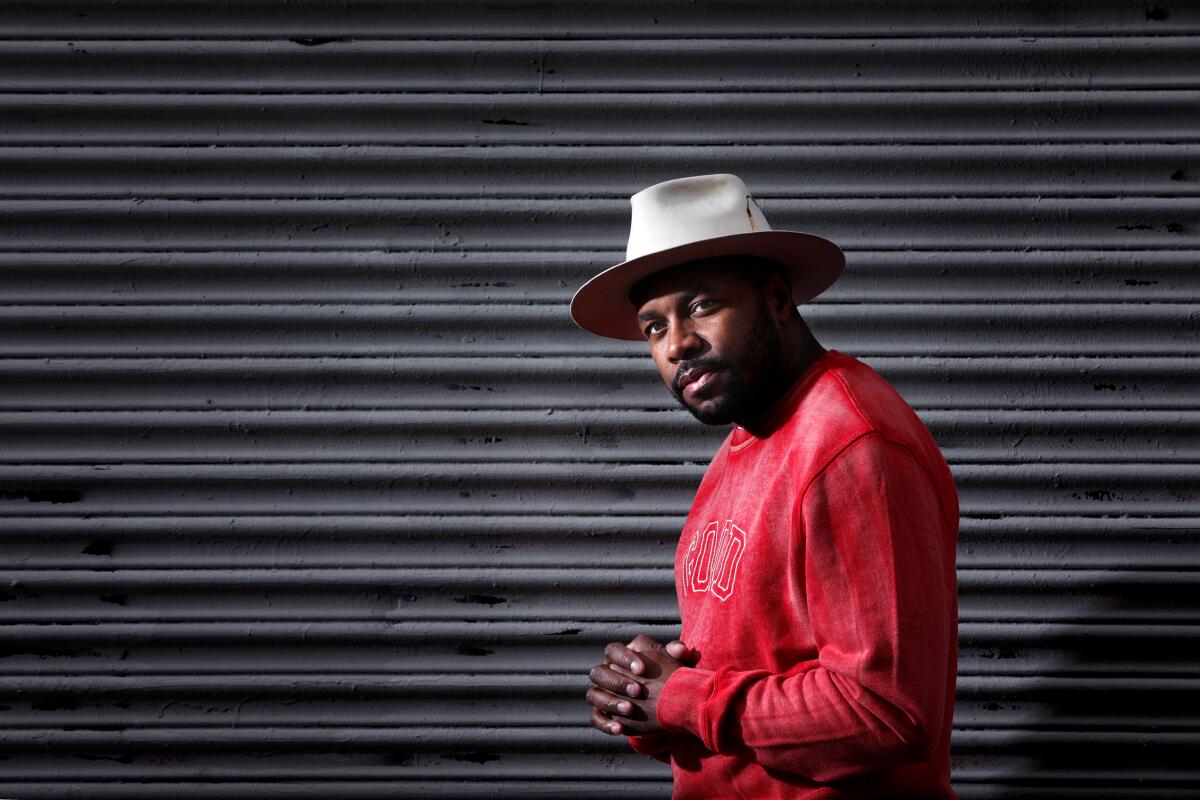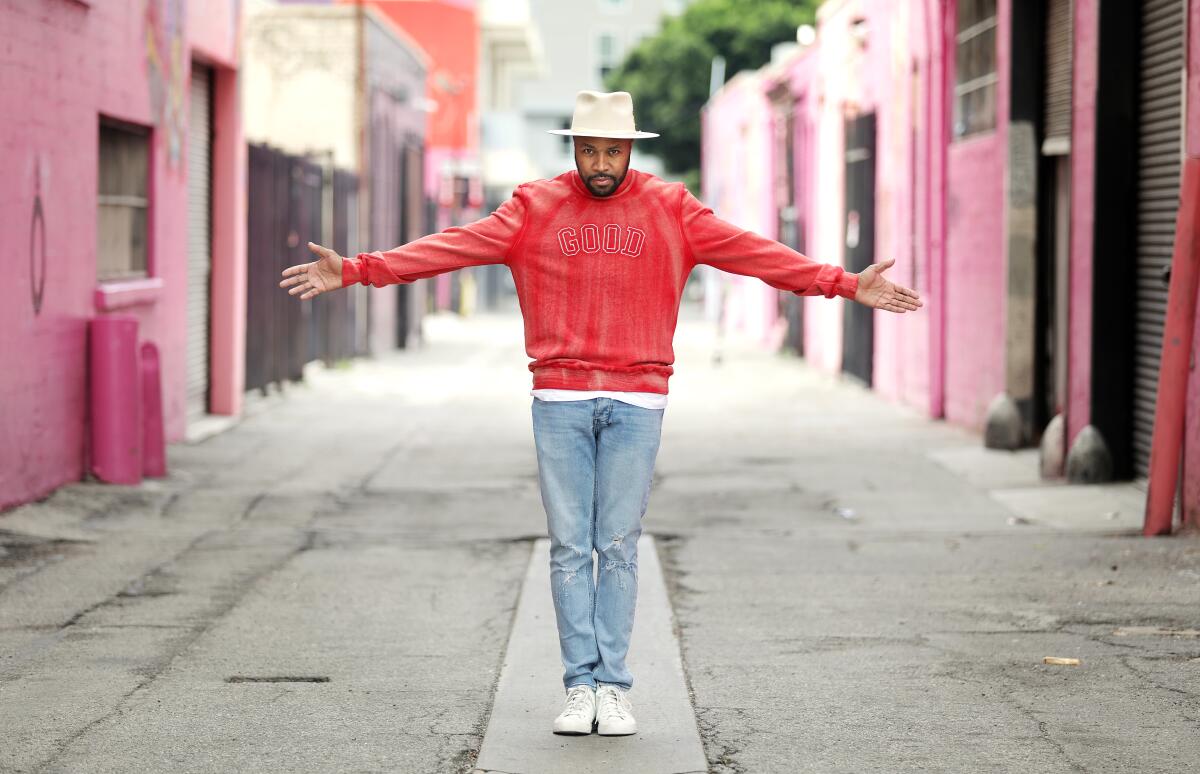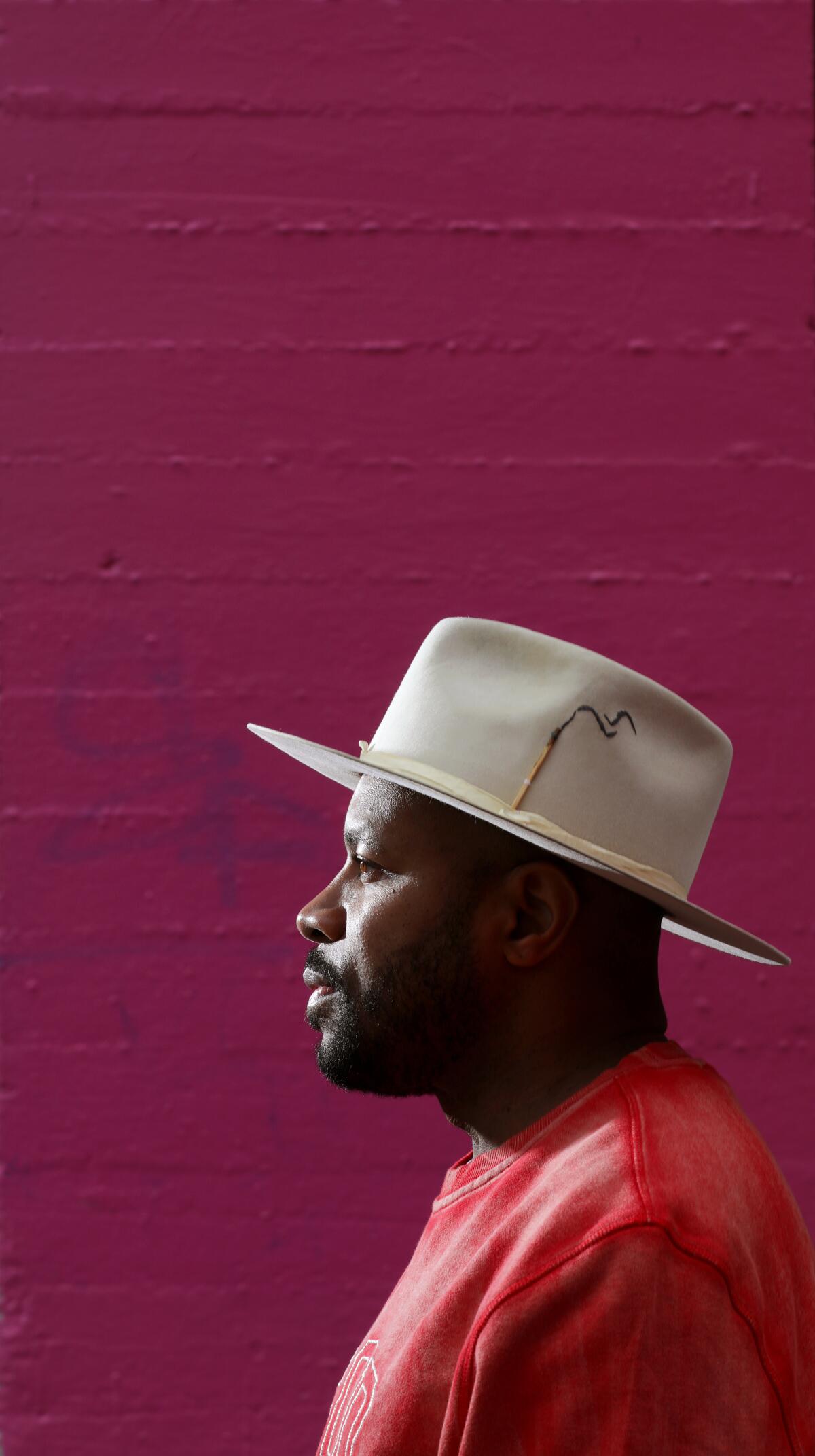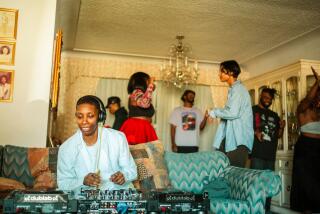From an L.A. living room, an unlikely coronavirus hero emerges: ‘Club Quarantine’s’ DJ D-Nice

- Share via
Nearly two decades ago, Derrick Jones’ career as a recording artist ended in unceremonious fashion: the record industry dumped him.
Jones, a Bronx-born DJ, producer, and rapper better known as D-Nice, started in music as a teenager in the mid-1980s as a member of Boogie Down Productions, the legendary hip-hop group. At 20, he embarked on a solo career, releasing two albums for Jive Records, “Call Me D-Nice” (1990) and “To tha Rescue” (1991). They were good records, full of slick rapping and gruff beats, produced by Nice himself; the debut album sold half a million copies and a single, “Call Me D-Nice,” reached No. 1 on Billboard’s Hot Rap Tracks chart.
But at a time when hit albums sold millions of copies and record executives viewed rappers as artists with unusually short shelf lives, those numbers didn’t cut it. Jive neglected to renew D-Nice’s contract and he was unable to find a deal with another label.
“Record companies really didn’t have patience back then, especially with hip-hop,” D-Nice says. “Rap didn’t age well. You were considered ‘old school’ really quickly, once you hit a certain age. That’s why I’ve always fought to remain relevant.”

Already binge-watched “Tiger King” and FaceTimed all your friends? Time to learn some handy skills, from cutting your own hair to training your cat to use the toilet.
Today, no one is disputing D-Nice’s relevance. Over the last week and a half, as the COVID-19 pandemic has sent billions around the world scrambling into quarantine, D-Nice, 49, has emerged as perhaps the hottest name in pop culture, a majordomo of a music universe that is reconstituting itself online in performances livestreamed on social media platforms.
Since March 17, D-Nice has used his Instagram feed to stream DJ sets from his apartment in downtown L.A. The shows, billed as “Club Quarantine” or “Home School,” have emerged as the place-to-be musical happenings of the lockdown: dance parties featuring a buoyant mix of disco, funk, soul and hip-hop that have drawn hundreds of thousands of virtual revelers, including a range of celebrities: Rihanna, Oprah Winfrey and Joe Biden.
“It’s been a shock,” says D-Nice. “I mean, I haven’t left my house for more than a week, but I’m reaching all these people. You know, I’m just here in my living room. I’m halfway in my kitchen.”
It began spontaneously. D-Nice, who moved to L.A. from New York less than a year ago, spends much of his time on the road, DJing at clubs and events. He is accustomed to a packed schedule of travel, nightlife and socializing. But now, like nearly everybody, he’s stuck at home — quarantining alone in his high rise.
“I haven’t spent this much time at home since moving to L.A.,” he says. “I was just sitting here in quarantine, missing my family and friends. Obviously, the virus is stressful for everyone, so I was feeling that. I didn’t really know what to do with myself.”
What he decided to do was go to his Instagram page, turn on his web camera and play a little music. For that first livestream, on the 17th, D-Nice didn’t DJ, per se: He spun some favorite records and chatted, sharing musical insights, anecdotes and reminiscences for an audience of just 200 or so viewers.
“It was mostly friends and friends of friends,” he says. (Those friends included hip-hop luminaries like Black Thought of the Roots and Posdnuos of De La Soul.)
Word got around, and the next night, the audience grew to 1,500. It was then that D-Nice decided to turn the event into an actual party — or, rather, a virtual one. He hooked up his laptop to a DJ controller, set the equipment on his kitchen counter and began to mix records. He DJ’ed for several hours on Thursday, and by Friday the Instagram viewership had grown to tens of thousands, including dozens of celebrities.
“It just started to blow up,” D-Nice says. “All of a sudden, Seal popped in. Then Drake popped in. I was like: ‘Wait: this is becoming a thing.’”
The following night, Saturday, the “Club Quarantine” crowd swelled to proportions that had some commenters wondering if the Instagram Live interface could handle the traffic. D-Nice played for nine hours, and the procession of famous people “entering” the party in the scrolling comments stream reached dizzying levels, an army of A-listers — in particular, black musical and show business royalty — that we associate with award shows: Quincy Jones, Stevie Wonder, Halle Berry, Will Smith, Mary J. Blige, Alicia Keys, John Legend, Common, Jennifer Lopez, Khloé Kardashian, Tiffany Haddish, Patti LaBelle, Nile Rodgers, the Rev. Al Sharpton, Naomi Campbell, Missy Elliott, Lenny Kravitz, Snoop Dogg, Diddy. There were cameos by athletes (Magic Johnson, Steph Curry, Mike Tyson) and political figures (Biden, Bernie Sanders, Cory Booker). The arrival of Michelle Obama sent Nice into raptures. (“I love you FLOTUS!”) As the number of live streamers approached 100,000, the proprietor of the shop — Mark Zuckerberg, the chairman and founder of Facebook, which owns Instagram — popped in for a look around.
“I think we were at 95,000,” D-Nice recalls. “I looked up, and there was Zuckerberg. It was like, ‘Yo, Zuckerberg!’ People were commenting: ‘Mark, you need to take care of the algorithm here, baby!’ I started yelling into the mic: ‘Mark, c’mon, Mark! We don’t want this thing to crash!’ And then Zuckerberg posted: ‘You got this.’”
The parade of boldface names is part of the special appeal of “Club Quarantine.” Many viewers are discovering D-Nice for the first time, but he is well established in celebrity circles. When his recording career hit the skids, he found a new line of work in the music business as a photographer, doing shoots for magazines and album covers. As a DJ, he has played such high profile gigs as the farewell party at the Obama White House in January 2017.

The livestream gives viewers the experience a peek into this rarefied world. D-Nice spends much of the time shouting out the famous people who pop into the stream. (“LL Cool J, I see you. What up, man?” “Colin Kaepernick is in here!”) Often, D-Nice will hail the arrival of musicians by segueing into their records. When Janet Jackson’s name showed up on the scroll of livestream viewers, Nice launched into a mini-set of her music. The arrival of Lionel Richie brought one of the great moments of “Club Quarantine,” when Nice abruptly switched musical gears, cuing up Richie’s lustrous early ’80s ballad “You Are.”
It’s a new marker of Hollywood status: You know you’re big if you merit a D-Nice shoutout. Yet “Club Quarantine” is not exactly glamorous. The vibe is homey — even homely — and the aesthetic is low-tech. The sound isn’t great; the stream occasionally sputters and stalls. Viewers watch an unchanging tight shot of D-Nice’s face, silhouetted against the backdrop of his living room windows.

At a big club, on a floor packed with dancers, the DJ is often omnipresent but invisible, making himself known only through the music that washes over the crowd. But the livestream reverses the equation: It’s a close encounter with D-Nice. The musical mix combines the classic soundtrack of black cookouts — soul, R&B and hip-hop favorites — with deeper cuts: Nigerian Afrobeat titan Fela Kuti’s “Lady,” Bonnie Pointer’s sumptuous disco thumper “Free Me From My Freedom” and old-school rapper Special Ed’s “The Mission.”
Playing to an audience of shut-ins — a throng you can’t see — is a novel experience for a DJ. “I have no one in front of me,” D-Nice says. “If you’re at a party and you throw on the wrong song, you can look at someone’s body language. I can’t do that now. So I’m just following my instincts. These are a special set of conditions.”
Those unique conditions — the frightening reality of the COVID-19 pandemic — hangs over “Club Quarantine.” During his sets, D-Nice reminds viewers to wash their hands and to stay at home; he pays tribute to healthcare workers who are fighting the virus on the front lines. Dance parties have always been about transcendence and escape, but “Club Quarantine” is, by definition, an exercise in coping: an attempt to forge connection, to have a little fun, in a world that has turned upside down.
D-Nice is also using the platform to push causes he cares about. On Wednesday, he joined forces with Michelle Obama and the organization When We All Vote, hosting a live set to promote voter registration. (According to When We All Vote, it logged more that 400,000 texts and helped nearly 13,000 new voters register during the livestream.)

Meanwhile, D-Nice is omnipresent. He has appeared on the “Tonight Show With Jimmy Fallon”; Oprah interviewed him on her own live feed. This week, Spotify launched a playlist inspired by the parties, “DJ D-Nice’s Homeschool.” D-Nice imitators have sprung up, including several DJs — Kid Capri, DJ Premiere, Questlove — with similar old-school hip-hop pedigrees.
As for “Club Quarantine,” D-Nice has decided to space out the parties a bit, paring back the schedule to once or twice a week. (To catch a livestream, follow @djdnice on Instagram.) “I have to let it breathe a little,” he says. “I want it to stay special. You don’t want to burn this thing out.”
More to Read
The biggest entertainment stories
Get our big stories about Hollywood, film, television, music, arts, culture and more right in your inbox as soon as they publish.
You may occasionally receive promotional content from the Los Angeles Times.










